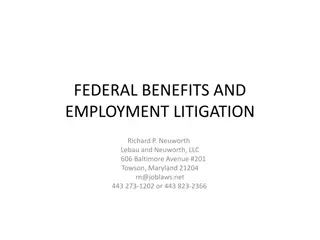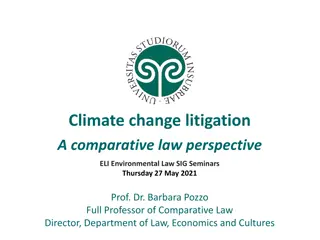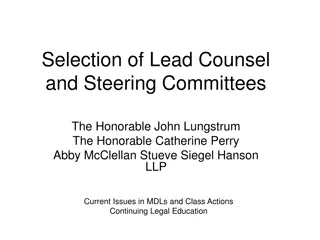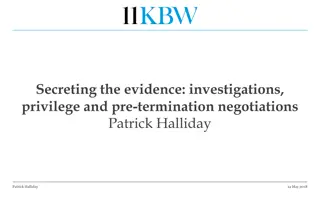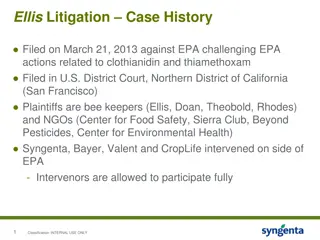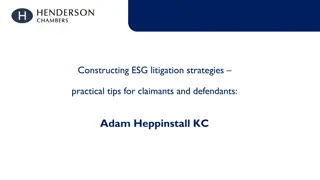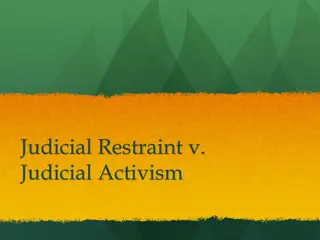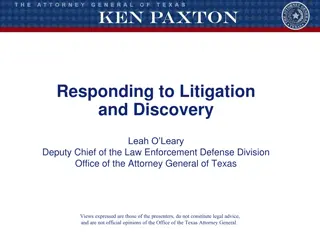Litigation and Judicial Processes
Understanding the litigation process, including trials and lawsuits, as a means to resolve disputes through legal action in court. Exploring the advantages and disadvantages of going to court, the importance of jurisdiction and applicable laws, and the binding nature of verdicts in legal proceedings. Highlighting the formal, time-consuming, and sometimes risky aspects of litigation compared to alternative dispute resolution methods. The authority and power of courts and judges to decide cases, investigate facts, and apply laws towards judgment are vital elements in the legal system.
Download Presentation

Please find below an Image/Link to download the presentation.
The content on the website is provided AS IS for your information and personal use only. It may not be sold, licensed, or shared on other websites without obtaining consent from the author.If you encounter any issues during the download, it is possible that the publisher has removed the file from their server.
You are allowed to download the files provided on this website for personal or commercial use, subject to the condition that they are used lawfully. All files are the property of their respective owners.
The content on the website is provided AS IS for your information and personal use only. It may not be sold, licensed, or shared on other websites without obtaining consent from the author.
E N D
Presentation Transcript
JUDICIAL EXTRAJUDICIAL
When alternative dispute resolution methods fail or prove insufficient people bring their argument to trial. A trial (litigation) is the process of proceeding against someone in a court of action, where one party files a lawsuit against another person.
A lawsuit. Legal action, including all proceedings therein. Contest in a court of law for the purpose of enforcing a right or seeking a remedy. A judicial contest, a judicial controversy, a suit at law. Black s Law Dictionary Definitions of the Terms and Phrases of American and English Jurisprudence, Ancient and Modern by Henry Campbell Black 5 ed.
Going to court has its advantages & disadvantages can you name them?
verdict is binding (coercive power of the state to enforce the judgment) right to appeal conduct of the trial is governed by established rules of evidence all persons and entities involved in a dispute typically can be joined as parties
expensive time-consuming chancy formal
JURISDICTION APPLICABLE LAW
It is the authority by which courts and judicial officers take cognizance of and decide cases. The power to make judicial decisions; a court s or judge s power to investigate the facts of a matter, apply law to them, and declare a judgment.
It is a set of rules regulating which courts have jurisdiction in legal disputes of a civil or commercial nature between individuals resident in different member states of the European Union (EU) and the European Free Trade Association detailed rules assigning jurisdiction for the dispute to be heard and governs the recognition and enforcement of foreign judgments. (EFTA). It has
The Brussels Convention of 27 September 1968 on Jurisdiction and the Enforcement of Judgments in Civil and Commercial Matters (as amended by various Accession Conventions) (Brussels Convention The Lugano Convention of 30 October 2007 on Jurisdiction and the Enforcement of Judgments in Civil and Commercial Matters (Lugano Convention) Council Regulation (EC) No 44/2001 of 22 December 2000 on Jurisdiction and the Recognition and Enforcement of Judgments in Civil and Commercial Matters (Brussels Regulation)3
REGULATION (EU) No 1215/2012 OF THE EUROPEAN PARLIAMENT AND OF THE COUNCIL of 12 December 2012 on jurisdiction and the recognition and enforcement of judgments in civil and commercial matters (recast)
The rules of jurisdiction should be highly predictable and founded on the principle that jurisdiction is generally based on the defendant s domicile. Jurisdiction should always be available on this ground save in a few well-defined situations in which the subject-matter of the autonomy of the parties warrants a different connecting factor. The domicile of a legal person must be defined autonomously so as to make the common rules more transparent and avoid conflicts of jurisdiction. dispute or the
Actor sequitur forum rei art.4 1. Subject to this Regulation, persons domiciled in a Member State shall, whatever their nationality, be sued in the courts of that Member State. art. 5 1. Persons domiciled in a Member State may be sued in the courts of another Member State only by virtue of the rules set out in Sections 2 to 7 of this Chapter.
In addition to the defendants domicile, there should be alternative grounds of jurisdiction based on a close connection between the court and the action or in order to facilitate the sound administration of justice. The existence of a close connection should ensure legal certainty and avoid the possibility of the defendant being sued in a court of a Member State which he could not reasonably have foreseen. This is important, particularly in disputes contractual obligations arising out of violations of privacy and rights relating including defamation concerning non- to personality,
SPECIAL JURISDICTION JURISDICTION IN MATTERS RELATING TO INSURANCE JURISDICTION OVER CONSUMER CONTRACS JURISDICTION OVER INDIVIDUAL CONTRACTS OF EMPLOYMENT EXCLUSIVE JURISDICTION
A person domiciled in a Member State may be sued in another Member State: 1) a) in matters relating to a contract, in the courts for the place of performance of the obligation in question; b) for the purpose of this provision and unless otherwise agreed, the place of performance of the obligation in question shall be: in the case of the sale of goods, the place in a Member State where, under the contract, the goods were delivered or should have been delivered, in the case of the provision of services, the place in a Member State where, under the contract, the services were provided or should have been provided; (c) if point (b) does not apply then point (a) applies;
2) in matters relating to tort, delict or quasi-delict, in the courts for the place where the harmful event occurred or may occur; (3) as regards a civil claim for damages or restitution which is based on an act giving rise to criminal proceedings, in the court seised of those proceedings, to the extent that that court has jurisdiction under its own law to entertain civil proceedings; (4) as regards a civil claim for the recovery, based on ownership, of a cultural object as defined in point 1 of Article 1 of Directive 93/7/EEC initiated by the person claiming the right to recover such an object, in the courts for the place where the cultural object is situated at the time when the court is seised;
(5) as regards a dispute arising out of the operations of a branch, agency or other establishment, in the courts for the place where the branch, agency or other establishment is situated; (6) as regards a dispute brought against a settlor, trustee or beneficiary of a trust created by the operation of a statute, or by a written instrument, or created orally and evidenced in writing, in the courts of the Member State in which the trust is domiciled; (7) as regards a dispute concerning the payment of remuneration claimed in respect of the salvage of a cargo or freight, in the court under the authority of which the cargo or freight in question: (a) has been arrested to secure such payment; or (b) could have been so arrested, but bail or other security has been given; provided that this provision shall apply only if it is claimed that the defendant has an interest in the cargo or freight or had such an interest at the time of salvage.
The autonomy of the parties to a contract, other than an insurance, consumer or employment contract, where only limited autonomy to determine the courts having jurisdiction is allowed, respected subject grounds of jurisdiction laid down in this Regulation should the be to exclusive
The insurance, consumer and employment contracts which may permit the "weaker party" to these contracts i.e. insurance consumers and employees to sue in their state of domicile. The Regulation also provides that where a defendant to such an action is domiciled outside of the EU but has a "branch, agency or other establishment" in the EU, it shall be deemed to be domiciled where the "branch,agency or other establishment" is located. Regulation provides special rules for policy holders,
The broadening of the domicile of the 'stronger' party, so that the 'weaker' party, be it the consumer, employer or insured individual, has an increased range of locations for suing the first, while at the same time not allowing this broadened sense of domicile the other way around.
(1) in proceedings which have as their object rights in rem in immovable property or tenancies of immovable property, the courts of the Member State in which the property is situated; (2) in proceedings which have as their object the validity of the constitution, the nullity or the dissolution of companies or other legal persons or associations of natural or legal persons, or the validity of the decisions of their organs, the courts of the Member State in which the company, legal person or association has its seat. In order to determine that seat, the court shall apply its rules of private international law;
(3) in proceedings which have as their object the validity of entries in public registers, the courts of the Member State in which the register is kept; (4) in proceedings concerned with the registration or validity of patents, trade marks, designs, or other similar rights required to be deposited or registered, irrespective of whether the issue is raised by way of an action or as a defence, the courts of the Member State in which the deposit or registration has been applied for, has taken place or is under the terms of an instrument of the Union or an international convention deemed to have taken place.
(5) in proceedings concerned with the enforcement of judgments, the courts of the Member State in which the judgment has been or is to be enforced.
Parties, regardless of their domicile have the right to determine in an agreement that a court or a courts of a Member State have jurisdiction to settle any disputes which have arisen or may arise in connection with relationship. a particular legal
Regulation (EC) No 593/2008 of the European Parliament and of the Council of 17 June 2008 on the law applicable to contractual obligations (Rome I) Regulation (EC) No 864/2007 of the European Parliament and of the Council of 11 July 2007 on the law applicable to non-contractual obligations (Rome II)
The parties have the right to choose the law that will govern their contract where this choice is expressly made or clearly demonstrated by the terms of the contract or the circumstances of the case. In the absence of choice of law by the parties, the contract would be governed by the law of the country with which it was most closely connected.
The law applicable to non-contractual obligations governs in particular: the basis and extent of liability, including determining who may be held liable; the grounds for exemption from liability and the limitation or division of liability; the existence, nature and assessment of damage and the remedy claimed; the measures the court may take to prevent or terminate injury or damage and ensure compensation; the manner in which an obligation may be extinguished and the rules relating to prescription or limitation; the question as to whether the right to seek compensation can be transferred to someone else, including by inheritance; persons entitled to compensation for damage they have sustained; liability for the acts of another person.
The law applicable to a non-contractual obligation arising out of a tort/delict is: 1) the law of the country where the damage occurs; or 2) the law of the country where both parties were primarily living or had their main place of business when the damage occurred; or 3) if the case is more closely connected with the law of another country, the law of that country.
Under certain conditions, the regulation also allows the parties to choose, by mutual agreement, which law applies to a non-contractual obligation.

 undefined
undefined










